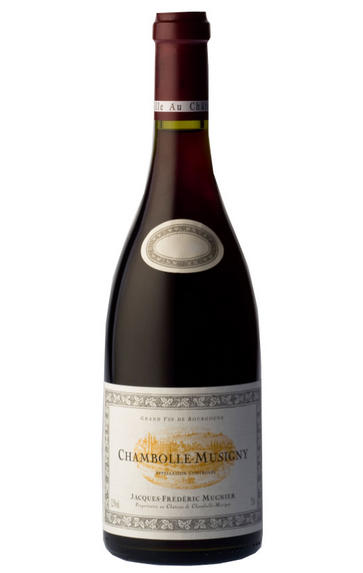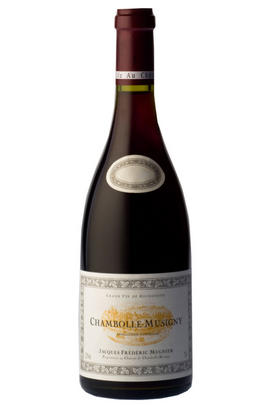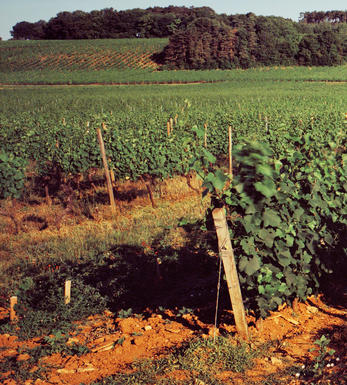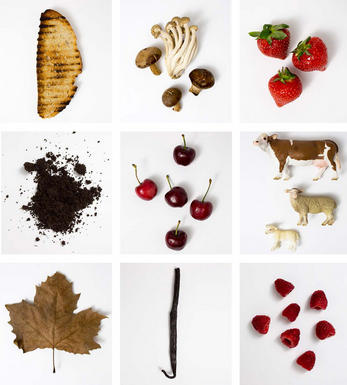
2014 Chambolle-Musigny, Jacques-Frédéric Mugnier, Burgundy

Critics reviews
The 2014 Chambolle-Musigny Village has a very pleasant and pure bouquet with strawberry pastilles, touches of chalk and flint, a little pinched initially but soon opening with aeration. The palate is medium-bodied with fleshy strawberry and tart cherry fruit, a touch of salinity and spice towards the cohesive finish. This is certainly approachable, although I would afford it for a couple of years in bottle.
Drink 2018 - 2028
Neal Martin, Wine Advocate (December 2016)
Bright medium red Compelling perfume of raspberry, flowers, game and leather, still with a touch of reduction Tactile and vibrant in the mouth, with complex flavours of red berries, flowers and flint accented by soil and light veggie nuances. Not as thick as the young 2015, but a wonderfully expressive and complete village wine.
Finishes saline and sweet, with fine-grained tannins and superb length and soil character. Frederic Mugnier noted that this wine can be kept for a long time. Still, they emphasized that it "doesn't benefit as much from ageing as the crus do."
Drink 2020 - 2028
Stephen Tanzer, Vinous.com (November 2016)
About this WINE

Domaine Jacques-Frederic Mugnier
Domaine Jacques-Frédéric Mugnier is based at the Château de Chambolle-Musigny, which has been in the Mugnier family since 1863. Frédéric Mugnier – the fifth generation of the family on the property – took over in 1985. As of 2004, he has reclaimed the Nuits-St Georges Clos de la Maréchale vineyard, which had been on lease to Faiveley since 1950.

Chambolle Musigny
Chambolle produces the most elegant wines in the Côte de Nuits, having more active chalk and less clay in the soil than the other villages. The wines may be a little lighter in colour and less tannic than Gevrey-Chambertin but they have a sublime concentration of fruit. Village Chambolle-Musigny usually provides excellent value.
Le Musigny is one of the top half-dozen vineyards in Burgundy, producing wines of extraordinary intensity and yet with a magical velvety character. Les Amoureuses is immediately appealing, a wonderfully sensual wine which deserves Grand Cru status. Bonnes Mares tends to have a firmer structure and ages very well
- 94 hectares of village Chambolle-Musigny.
- 61 hectares of Premier Cru vineyards (24 in all). The finest vineyards include Les Amoureuses, Les Charmes, Les Fuées, Les Baudes and Sentiers.
- 24 hectares of Grand Cru vineyard - Bonnes Mares and Le Musigny.
- Recommended producers: de Vogüé, Mugnier, Roumier, Barthod.
- Recommended restaurant: Le Chambolle

Pinot Noir
Pinot Noir is probably the most frustrating, and at times infuriating, wine grape in the world. However when it is successful, it can produce some of the most sublime wines known to man. This thin-skinned grape which grows in small, tight bunches performs well on well-drained, deepish limestone based subsoils as are found on Burgundy's Côte d'Or.
Pinot Noir is more susceptible than other varieties to over cropping - concentration and varietal character disappear rapidly if yields are excessive and yields as little as 25hl/ha are the norm for some climats of the Côte d`Or.
Because of the thinness of the skins, Pinot Noir wines are lighter in colour, body and tannins. However the best wines have grip, complexity and an intensity of fruit seldom found in wine from other grapes. Young Pinot Noir can smell almost sweet, redolent with freshly crushed raspberries, cherries and redcurrants. When mature, the best wines develop a sensuous, silky mouth feel with the fruit flavours deepening and gamey "sous-bois" nuances emerging.
The best examples are still found in Burgundy, although Pinot Noir`s key role in Champagne should not be forgotten. It is grown throughout the world with notable success in the Carneros and Russian River Valley districts of California, and the Martinborough and Central Otago regions of New Zealand.


Buying options
Add to wishlist
Description
The 2014 Chambolle-Musigny Village has a very pleasant and pure bouquet with strawberry pastilles, touches of chalk and flint, a little pinched initially but soon opening with aeration. The palate is medium-bodied with fleshy strawberry and tart cherry fruit, a touch of salinity and spice towards the cohesive finish. This is certainly approachable, although I would afford it for a couple of years in bottle.
Drink 2018 - 2028
Neal Martin, Wine Advocate (December 2016)
wine at a glance
Delivery and quality guarantee